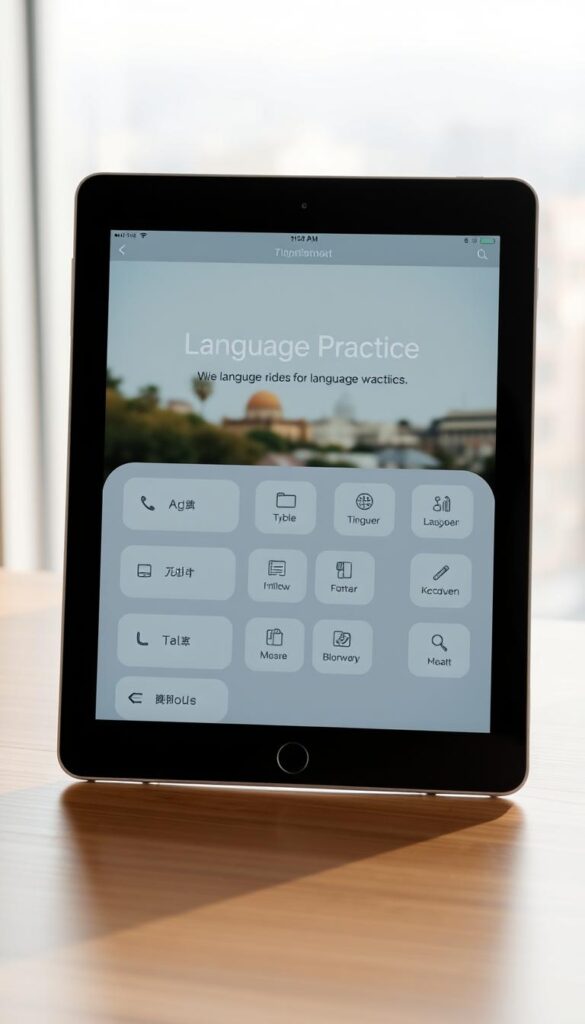
Imagine talking fluently in a foreign language. You could connect with people from different cultures and open up new career paths. Thanks to online learning, virtual language practice is now easier than ever.
Platforms like Ovation, Babbel, and HelloTalk have many tools to boost your language skills. They’re perfect for anyone, whether you’re just starting or already know a lot. These sites are great places to elevate your skills and reach your goals.
Key Takeaways
- Virtual language practice is becoming increasingly popular with online learning platforms.
- Ovation, Babbel, and HelloTalk are leading tools for language learners.
- These platforms offer a range of features to improve language skills.
- Virtual practice is accessible for learners of all levels.
- Online language practice can help achieve fluency and broaden cultural understanding.
What is Virtual Language Practice?
Technology has made virtual language practice a key part of learning languages today. It uses digital tools to make learning fun and interactive. This way, learners can improve their language skills easily.
Definition and Overview
Virtual language practice uses online tools to help people learn languages. It includes many activities, like guided conversations and interactive exercises. These activities aim to boost language skills.
Benefits of Language Practice
Virtual language practice has many advantages. It lets learners practice at their own speed, anytime, anywhere. It also connects them with native speakers through various platforms.
- Improved pronunciation through interactive speaking exercises
- Enhanced grammar and vocabulary skills
- Opportunities to engage in conversations with native speakers
Platforms like Babbel and HelloTalk are great for virtual language practice. Babbel has Guided Conversations and an AI Conversation Partner for practice. HelloTalk connects users with native speakers for language exchange.
Popular Platforms for Virtual Practice
Many platforms are known for their role in virtual language practice. Here’s a look at some of them:
| Platform | Key Features | Language Options |
|---|---|---|
| Babbel | Guided Conversations, AI Conversation Partner | 14 languages |
| HelloTalk | Language Exchange, Native Speaker Interaction | 150+ languages |
| Duolingo | Gamified Learning, Interactive Exercises | 30+ languages |
The Importance of Language Immersion
Virtual language immersion has changed how we learn languages. It makes learning more accessible and effective. By being surrounded by the language, learners get a natural learning environment. This helps them understand and remember faster.
Enhancing Learning through Immersion
Immersion makes learning better by showing learners the language in use. This way, they learn to understand and use the language naturally. For example, watching TV shows or movies in the target language helps learners pick up on pronunciation and usage.
Ovation’s use of VR and AI for realistic speaking scenarios shows how technology can improve immersion. Learners can practice speaking in a real-like setting without being there in person.
“The best way to learn a language is to surround yourself with it.”
Techniques for Creating an Immersive Experience
There are many ways to make language learning immersive. These include:
- Listening to music or podcasts in the target language
- Watching TV shows or movies with subtitles in the target language
- Speaking with native speakers or language exchange partners
- Using virtual reality (VR) or augmented reality (AR) tools to simulate real-life scenarios
| Technique | Description | Benefits |
|---|---|---|
| Music and Podcasts | Listening to content in the target language | Improves listening skills and gets you used to different accents |
| TV Shows and Movies | Watching visual content with subtitles in the target language | Enhances comprehension and vocabulary |
| Speaking with Natives | Engaging in conversations with native speakers | Improves speaking skills and builds confidence |

Choosing the Right Tools for Virtual Practice
Finding the right tools for virtual language practice is crucial. There are many language learning apps, online communities, and resources out there. It’s important to find the ones that match your learning style.
Best Apps for Language Learning
Many language learning apps are popular for their interactive features. Babbel is known for its structured lessons and focus on speaking skills. It aims to make you conversational in your target language.
Babbel uses grammar explanations, vocabulary building, and speaking exercises to help you.
HelloTalk is another great app. It connects learners with native speakers for language exchange. A review says, “HelloTalk is perfect for improving your language skills through real conversations.”
“Language learning is not just about grammar and vocabulary; it’s about understanding the culture and nuances of the language.”

⭐️ Tap the exclusive deal link https://temu.to/k/uot8tcxvwum to score top-quality items at ultra-low prices. 🛍️ These unbeatable deals are only available here. Shop now and save big! ⭐️ Directly get exclusive deal in Temu app here: https://app.temu.com/m/mhb5rstagbx
Another surprise for you! Click https://temu.to/k/uag0bn0o0wd to earn with me together🤝!
Online Communities and Resources
Online communities and resources are also key for virtual language practice. Websites like Reddit’s language learning community are great for sharing tips and asking questions. A user says, “The community is very supportive and helpful; it’s a great place to find language exchange partners.”
- Online forums dedicated to language learning
- Social media groups focused on language exchange
- YouTube channels offering language lessons
These resources can add to what you learn from apps. They offer a more complete way to learn a language.
Engaging with Native Speakers
Talking to native speakers is a great way to get better at a language. It lets you see how the language is used in everyday life. Native speakers can help with pronunciation, teach slang, and share cultural insights that are very helpful.

Finding Language Exchange Partners
Finding the right person to practice with can really help. Sites like HelloTalk let you meet native speakers. It’s important to be clear about what you want from your language exchange partner.
Think about what you’re looking for in a language exchange. Do you want to chat casually, get grammar help, or talk about certain topics? Being clear about your goals can help you find the right person.
Tips for Effective Conversations
To get the most out of your language exchange, follow a few tips. First, be consistent in your practice. Short, regular chats are better than long, rare ones.
- Start with simple topics and gradually move to more complex discussions.
- Don’t be afraid to ask for clarification or correction.
- Use a variety of media, like videos or images, to stimulate conversation.
Good conversations go both ways. Be ready to listen and answer thoughtfully. And don’t be shy to share your culture and experiences.
Structured Learning vs. Free Conversation
Effective language speaking practice needs a mix of structured learning and free conversation. Each method has its own strengths. Knowing how to use them can really help improve your language skills.
Structured learning lays down the basics of grammar, vocabulary, and syntax. It’s great for beginners who need to learn the language’s foundation. Babbel offers Guided Conversations that use a structured method. This helps learners feel more confident in their language abilities.
Benefits of Structured Lessons
Structured lessons have many benefits. They provide a clear learning path, show progress, and let you focus on specific areas. This method is good for those who like a traditional learning setting.
- Clear learning objectives
- Personalized feedback
- Progress tracking
Balancing Structure and Flexibility
But, it’s also key to add free conversation practice. This boosts fluency and understanding. Babbel’s AI Conversation Partner is perfect for this. It lets learners have more spontaneous and natural talks.
| Learning Approach | Benefits | Tools/Platforms |
|---|---|---|
| Structured Learning | Clear learning path, measurable progress | Babbel’s Guided Conversations |
| Free Conversation | Enhanced fluency, natural speech | Babbel’s AI Conversation Partner |
Mixing structured learning with free conversation helps learners understand the language better. This balanced way makes learning more flexible and adaptable.

Setting Goals for Your Language Journey
Setting realistic goals is key to your language learning journey. It keeps you focused and motivated. Whether you’re starting out or already advanced, clear goals help you move forward.
In a language learning community like HelloTalk, you can share your goals. This way, you and others can track your progress together. It creates a supportive space that helps learners stay on track.
Objective Milestones
It’s important to know the difference between short-term and long-term goals. Short-term goals might be finishing a set number of language lessons or practicing with a native speaker for a certain time each week. Long-term goals could be to become fluent or have complex conversations.
Short-term goals give you immediate motivation and a feeling of achievement. Long-term goals guide and give purpose to your learning journey.
| Goal Type | Examples | Benefits |
|---|---|---|
| Short-Term | Completing 10 language lessons, practicing for 30 minutes daily | Immediate motivation, sense of accomplishment |
| Long-Term | Achieving fluency, holding complex conversations | Direction, purpose, measurable progress |
Monitoring Progress
It’s crucial to track your progress to stay motivated and adjust your learning plan. Use language learning apps, journals, or forums to log your achievements. Reflect on your journey regularly.

By setting clear goals and tracking your progress, you can make your language learning journey fulfilling and effective. Share your achievements with your language learning community to stay inspired.
Overcoming Challenges in Virtual Practice
More people are using virtual language practice. It’s key to know how to beat common challenges for success. Online learning platforms have tools and resources, but learners face many hurdles.
Common Obstacles Learners Face
Online language learners face many obstacles. Staying motivated, overcoming speaking fears, and dealing with tech issues are big ones. Staying motivated is hard without face-to-face interaction and home distractions.
The fear of making mistakes when speaking or writing in a new language is another big challenge. This fear can stop learners from fully engaging. Also, tech problems like bad internet or not knowing how to use the platform can slow down learning.

Strategies for Staying Motivated
To beat these challenges, learners can use several strategies. Setting clear and achievable goals is a great motivator. By setting short-term and long-term goals, learners can see their progress and stay on track.
Another good strategy is to engage with native speakers through language exchange programs or online communities. This boosts language skills and gives a sense of achievement. Regular practice, whether in lessons or free conversations, keeps momentum going.
| Strategy | Description | Benefit |
|---|---|---|
| Set Clear Goals | Define achievable objectives | Enhanced motivation and focus |
| Engage with Native Speakers | Participate in language exchange programs | Improved language skills and confidence |
| Regular Practice | Consistent engagement with the language | Better retention and fluency |
By knowing the common obstacles and using effective strategies, learners can beat virtual language practice challenges. They can reach their language learning goals.
Integrating Culture in Language Learning
To truly master a language, exploring the cultural contexts is key. Language and culture are closely linked. Understanding cultural nuances can greatly improve your language skills.
The Role of Culture in Language Mastery
Culture is crucial in language learning. It adds context and makes the language more relatable. Virtual language practice platforms help by connecting learners with native speakers who share cultural insights.
For example, platforms like HelloTalk let learners talk with native speakers. This gives them a peek into cultural contexts and nuances. It not only boosts language skills but also deepens cultural understanding.

Ways to Explore Cultural Contexts
Exploring cultural contexts through virtual language practice is easy:
- Chat with native speakers on language exchange platforms.
- Join online cultural events or webinars.
- Watch TV shows or movies in the target language with English subtitles.
- Listen to music and podcasts from the culture linked to the language.
By adding these activities to your learning routine, you’ll understand the language and its culture better.
Using a language exchange platform is especially helpful. It connects you directly with native speakers and their cultural practices. This helps in learning the language and promotes cross-cultural understanding.
Future Trends in Virtual Language Practice
The world of language learning is changing fast, thanks to new tech. Virtual language practice will become even more key in learning languages.
Advancements in AI Technology
AI is changing language learning apps, like Babbel’s AI Conversation Partner. These tools give feedback and let you have real-time chats. This makes learning more fun and effective.
Emerging Trends in Virtual Reality
Virtual reality (VR) is also changing how we learn languages, as seen in Ovation. VR lets you explore real-world settings, making learning more interactive and immersive.
We’ll see even more cool tech in virtual language practice soon. This will include AI, VR, and other tech to make learning languages fun and effective.



